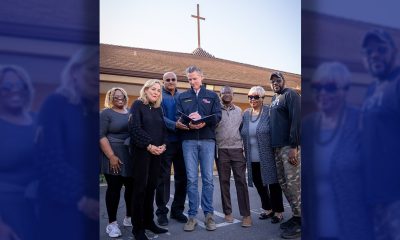#NNPA BlackPress
Military veteran and sports enthusiast impacts African American history
CHICAGO CRUSADER — As a civil rights leader, military veteran, sports enthusiast, educator and advocate for social justice, Hyde Park resident Dr. James W. Johnson has impacted many lives throughout his illustrious career. A former athlete at Dunbar High School during the 50s, and now a retired professor of history from the University of Alabama A&M, Johnson has influenced students, athletes, politicians, dignitaries, ministers and a host of other prominent individuals throughout his lifetime.
By J. G. Phillips
As a civil rights leader, military veteran, sports enthusiast, educator and advocate for social justice, Hyde Park resident Dr. James W. Johnson has impacted many lives throughout his illustrious career.
A former athlete at Dunbar High School during the 50s, and now a retired professor of history from the University of Alabama A&M, Johnson has influenced students, athletes, politicians, dignitaries, ministers and a host of other prominent individuals throughout his lifetime.
“I served as a private in the U.S. Army from 1957 to 1959,” Johnson said. “The Korean War had ended but the draft continued. I was drafted in 1957 and served a two-year tour of duty in the Panama Canal Zone where the Army trained me as a medic and x-ray technician.”
With a strong background in history, Johnson was credited as a pioneer in the South, for launching and spearheading the “Buffalo Soldiers” exhibit project in 1995.
The project was a historical exhibit that was once displayed in the James H. Wilson Hall at the University of Alabama A&M Black Archives Research Center and Museum in Huntsville, AL during the 90s.
“As a tribute to the soldiers, I wanted to create a permanent exhibit for the Black Archives Research Center,” Johnson said. “I served as director of the museum (during the time) and had a hand in obtaining national historic landmark status for Alabama A&M University’s James H. Wilson building.”
The exhibit was dedicated to the 10th Calvary Regiment, a group of all Black soldiers who were dubbed “Buffalo Soldiers” by Native Americans during the Indian Wars of the late 1800s. The group was also known for its combat in the Spanish American War, the Philippine-American War, the Mexican Expedition, World War I, World War II, the Vietnam War, the Iraq War and the Afghanistan War, making a strong impact throughout history.
When asked how the military impacted his life, Johnson shared his struggles, his journey and his solutions on how he dealt with racism as a soldier.
“Traveling to U.S. Army bases for training and to Panama, changed my world-view,” Johnson said. “I was able to gain a better understanding of politics and history. I grew up in Chicago. While traveling with the Army from Ft. Leonard Wood, MO, to Ft. Polk, LA, one day our bus stopped at a restaurant [in the South] with a sign saying ‘Colored Eat in Back.’ I did not go into the restaurant. I got sick to my stomach.”
Johnson said that he and his wife also experienced racism while he was stationed in Panama during the pre-Civil Rights era. While applying for a house outside of the military base, a real estate agent rejected Johnson and his wife immediately and told them that the property they were looking to purchase was “already sold to a white couple,” Johnson said. They were also told that Blacks were not allowed to live in the area due to previous segregation housing laws (in spite of President Harry Truman lifting the ban on housing segregation during the 50s).
”After my service ended, the Civil Rights movement was kicking into gear,” Johnson said. “I became attuned to history and politics. I later used the GI Bill to fund my graduate level studies in African American history.
After the incident, Johnson decided to support his family by working as a technician in the medical field and an agent in real estate property management while earning a bachelor’s degree from Chicago State University. He also earned a master’s degree and a doctorate from the University of Missouri-Columbia, focusing on African American Studies. One of his first scholarly articles analyzed the role of America’s Black press in covering and shaping national and international politics.
As a staunch advocate for historical preservation and a well-respected authoritarian in African American history, Johnson, a Fulbright Scholar, would go on to teach at the University of Maiduguri in Nigeria while participating in studies in Ghana, where he expanded his understanding in African culture and traditional religions in addition to traveling to Senegal, Liberia and Sierra Leone in his lifetime.
Since August of 2009, Johnson now 84, has lived at a residence for senior citizens in Hyde Park, where he currently commits to helping others.
This article originally appeared in The Chicago Crusader.
#NNPA BlackPress
Remembering George Floyd
#NNPA BlackPress
OP-ED: Oregon Bill Threatens the Future of Black Owned Newspapers and Community Journalism
BLACKPRESSUSA NEWSWIRE — Nearly half of Oregon’s media outlets are now owned by national conglomerates with no lasting investment in local communities. According to an OPB analysis, Oregon has lost more than 90 news jobs (and counting) in the past five years. These were reporters, editors and photographers covering school boards, investigating corruption and telling community stories, until their jobs were cut by out-of-state corporations.

By Dr. Benjamin F. Chavis, Jr.
President and CEO, National Newspaper Publishers Association
For decades, The Skanner newspaper in Portland, the Portland Observer, and the Portland Medium have served Portland, Oregon’s Black community and others with a vital purpose: to inform, uplift and empower. But legislation now moving through the Oregon Legislature threatens these community news institutions—and others like them.
As President and CEO of the National Newspaper Publishers Association (NNPA), which represents more than 255 Black-owned media outlets across the United States—including historic publications like The Skanner, Portland Observer, and the Portland Medium—l believe that some Oregon lawmakers would do more harm than good for local journalism and community-owned publications they are hoping to protect.
Oregon Senate Bill 686 would require large digital platforms such as Google and Meta to pay for linking to news content. The goal is to bring desperately needed support to local newsrooms. However, the approach, while well-intentioned, puts smaller, community-based publications at a future severe financial risk.
We need to ask – will these payments paid by tech companies benefit the journalists and outlets that need them most? Nearly half of Oregon’s media outlets are now owned by national conglomerates with no lasting investment in local communities. According to an OPB analysis, Oregon has lost more than 90 news jobs (and counting) in the past five years. These were reporters, editors, and photographers covering school boards, investigating corruption, and telling community stories, until their jobs were cut by out-of-state corporations.
Legislation that sends money to these national conglomerate owners—without the right safeguards to protect independent and community-based outlets—rewards the forces that caused this inequitable crisis in the first place. A just and inclusive policy must guarantee that support flows to the front lines of local journalism and not to the boardrooms of large national media corporations.
The Black Press exists to fill in the gaps left by larger newsrooms. Our reporters are trusted messengers. Our outlets serve as forums for civic engagement, accountability and cultural pride. We also increasingly rely on our digital platforms to reach our audiences, especially younger generations—where they are.
We are fervently asking Oregon lawmakers to take a step back and engage in meaningful dialogue with those most affected: community publishers, small and independent outlets and the readers we serve. The Skanner, The Portland Observer, and The Portland Medium do not have national corporate parents or large investors. And they, like many smaller, community-trusted outlets, rely on traffic from search engines and social media to boost advertising revenue, drive subscriptions, and raise awareness.
Let’s work together to build a better future for Black-owned newspapers and community journalism that is fair, local,l and representative of all Oregonians.
Dr. Benjamin F. Chavis Jr., President & CEO, National Newspaper Publishers Association
#NNPA BlackPress
Hate and Chaos Rise in Trump’s America
BLACKPRESSUSA NEWSWIRE — Tactics ranged from local policy manipulation to threats of violence. The SPLC documented bomb threats at 60 polling places in Georgia, traced to Russian email domains.

By Stacy M. Brown
Black Press USA Senior National Correspondent
The Southern Poverty Law Center has identified 1,371 hate and antigovernment extremist groups operating across the United States in 2024. In its latest Year in Hate & Extremism report, the SPLC reveals how these groups are embedding themselves in politics and policymaking while targeting marginalized communities through intimidation, disinformation, and violence. “Extremists at all levels of government are using cruelty, chaos, and constant attacks on communities and our democracy to make us feel powerless,” said SPLC President Margaret Huang. The report outlines how hard-right groups aggressively targeted diversity, equity, and inclusion (DEI) initiatives throughout 2024. Figures on the far right falsely framed DEI as a threat to white Americans, with some branding it a form of “white genocide.” After the collapse of Baltimore’s Francis Scott Key Bridge, a former Utah legislator blamed the incident on DEI, posting “DEI = DIE.”
Tactics ranged from local policy manipulation to threats of violence. The SPLC documented bomb threats at 60 polling places in Georgia, traced to Russian email domains. Similar threats hit Jewish institutions and Planet Fitness locations after far-right social media accounts attacked them for trans-inclusive policies. Telegram, which SPLC describes as a hub for hate groups, helped extremists cross-recruit between neo-Nazi, QAnon, and white nationalist spaces. The platform’s lax moderation allowed groups like the Terrorgram Collective—designated terrorists by the U.S. State Department—to thrive. Militia movements were also reorganized, with 50 groups documented in 2024. Many, calling themselves “minutemen,” trained in paramilitary tactics while lobbying local governments for official recognition. These groups shared personnel and ideology with white nationalist organizations.
The manosphere continued to radicalize boys and young men. The Fresh & Fit podcast, now listed as a hate group, promoted misogyny while mocking and attacking Black women. Manosphere influencers used social media algorithms to drive youth toward male-supremacy content. Turning Point USA played a key role in pushing white nationalist rhetoric into mainstream politics. Its leader Charlie Kirk claimed native-born Americans are being replaced by immigrants, while the group advised on Project 2025 and organized Trump campaign events. “We know that these groups build their power by threatening violence, capturing political parties and government, and infesting the mainstream discourse with conspiracy theories,” said Rachel Carroll Rivas, interim director of the SPLC’s Intelligence Project. “By exposing the players, tactics, and code words of the hard right, we hope to dismantle their mythology and inspire people to fight back.”
Click here for the full report or visit http://www.splcenter.org/resources/guides/year-hate-extremism-2024.
-

 #NNPA BlackPress3 weeks ago
#NNPA BlackPress3 weeks agoMLK Bust Quietly Removed from Oval Office Under Trump
-

 Activism3 weeks ago
Activism3 weeks agoOakland Post: Week of April 30 – May 6, 2025
-

 Activism3 weeks ago
Activism3 weeks agoOakland Post: Week of May 7 – 13, 2025
-

 #NNPA BlackPress3 weeks ago
#NNPA BlackPress3 weeks agoTrump Abruptly Fires First Carla Hayden: The First Black Woman to Serve as Librarian of Congress
-

 Activism4 weeks ago
Activism4 weeks agoCalifornia Rideshare Drivers and Supporters Step Up Push to Unionize
-

 Activism1 week ago
Activism1 week agoNew Oakland Moving Forward
-

 #NNPA BlackPress3 weeks ago
#NNPA BlackPress3 weeks agoBlack America Celebrates African Descent Heritage of Pope Leo XIV
-

 Activism4 weeks ago
Activism4 weeks agoGov. Newsom Approves $170 Million to Fast Track Wildfire Resilience



















































